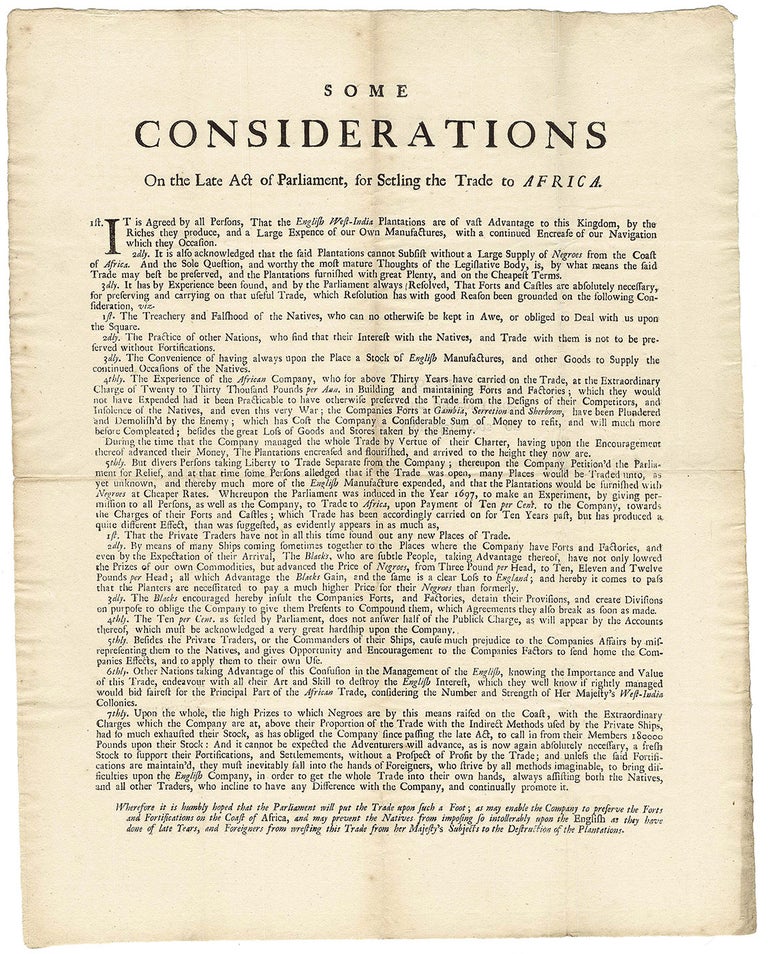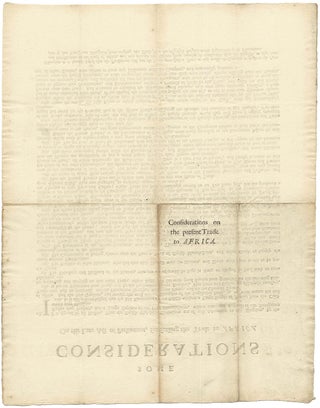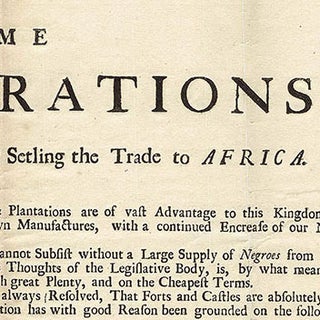Some Considerations on the Late Act of Parliament , for Setling the Trade to Africa.
[London, 1708]. Letterpress broadside on laid paper, printed area 13”h x 9.75”w on a 16”h x 12.75”w sheet of laid paper, untrimmed. Three lines of headline type surmounting one column of text. Docketed in type on verso. An exceptionally rare 1708 broadside arguing for the restoration of the Royal African Company’s monopoly on the slave trade, with substantial reference to the central role of slavery in the economy of Britain’s American “plantations.” Written with a Colonial audience in mind, with copies sent to the British colonies in Virginia and the Caribbean. Background
Chartered by Charles II in 1672 and headed by his brother the Duke of York (later James II), for more than two decades the Royal African Company held a monopoly of trade with Africa. In the reign of King William III, however, Parliament passed the Trade with Africa Act (IX Will III c.26, 1697) terminating the Company’s monopoly and allowing “separate traders” to enter the market. The law was to remain in effect for 13 years but softened the blow to the Company by requiring the separate traders to pay it 10% of the value of the goods they exported to Africa.
Soon enough the separate traders came to resent the levy, and in March 1707 they unsuccessfully petitioned Parliament for its abolition. As the termination date of the 1698 law approached, the Company petitioned for the reinstatement of its monopoly, arguing that the expense of defending and maintaining its network of coastal forts was ruinous, even as they benefited its competitors. It also argued that the presence of rival traders in the coastal areas was driving down the price of trade goods while inflating the price of slaves. The separate traders, their numbers strengthened by Scottish merchants following 1707 Act of Union, naturally fought to maintain the open market.
The Broadside
The parties to the dispute conducted an extensive and sustained propaganda campaign in support of their case, in an attempt to influence stakeholders both in Great Britain and its overseas colonies. In 1708 Thomas Pindar, a merchant with interests in the Leeward Islands and, from 1703–10, Deputy Governor of the Royal African Company (Pettigrew, p. 130), produced “several pamphlets to be written, printed, and circulated throughout London, the provinces, and the colonies… as part of the company’s attempts to compete with the separate traders’ transatlantic propaganda machine and prevent them from increasing their foothold in the colonies” (ibid., p. 132). According to Pettigrew, “thirty of each were printed for Barbados, twenty for Antigua, ten for Montserrat, twenty for Nevis, ten for Saint Christopher, twenty to Jamaica, and thirty for Virginia” (ibid., p. 133 note 23).
Offered here is one of Pindar’s polemics in broadside format, bearing the title SOME CONSIDERATIONS On the Late Act of Parliament, for Setling the Trade to AFRICA (Though Pettigrew describes Pindar’s works as “pamphlets,” ESTC and OCLC record this title in broadside only).
Pindar begins his argument by stating what can be “Agreed by all Persons,” namely “That the English West-India Plantations are of vast Advantage to this Kingdom”; “that the said Plantations cannot subsist without a Large Supply of Negroes from the Coast of Africa”; and “That Forts and Castles are absolutely necessary, for preserving and carrying on that useful Trade.” He then outlines the reasons for the utility of these forts on the West African coast, and the enormous expense and risk undergone by the Royal African Company in maintaining and defending them. None of this would have happened, he argues, without the monopoly power granted in its charter.
He then summarizes the separate traders’ arguments, which had ultimately led to the 1697 Trade with Africa Act and the breaking of the Company’s monopoly: “Some persons alleged that if the Trade was open, many Places would be Traded unto, as yet unknown, and thereby much more of the English Manufacture expended, and that the Plantations would be furnished with Negroes at cheaper rates.” In reality, he continues, the experience of the past ten years demonstrates that the Act has had the opposite effect: “new Places of Trade” have not been discovered; competition has both devalued English trade goods while the prices for slaves have tripled or even quadrupled; the Company’s forts have been attacked by “the Natives”; while other European trading nations work “to destroy the English Interest.” Furthermore, the ten percent levy on the separate traders has not covered the Company’s costs, and it has been “obliged… to call in from their Members 180000 Pounds upon their stock.”
The peroration dials up the rhetoric to maximum volume by arguing that the ongoing activities of the separate traders presents an existential threat to Great Britain’s American colonies:
it is humbly hoped that the Parliament will put the Trade upon such a Foot; as may enable the Company to preserve the Forts and Fortifications on the Coast of Africa, and may prevent the Natives from imposing so intollerably upon the English as they have done of late Years, and Foreigners from wresting this Trade from her Majesty’s Subjects to the Destruction of the Plantations.
In the end, the Royal African Company’s monopoly was confirmed in 1714, “due mainly to the West Indian planters who switched their support from the separate traders to the Royal African company” (Inikori, p. 626). Presumably polemics such as Pindar’s played a significant role in this change of allegiance. In the end, it was all for naught, as Parliament abolished the monopoly once and for all in 1726. By the time the Company was dissolved in 1750, it had been responsible for shipping hundreds of thousands of slaves to British plantations in North America and the Caribbean.
REFERENCES
As of June 2019 ESTC T134773 records holdings at the British Library, Longleat House, Chetham’s Library (Manchester), California State Library-Sutro, Columbia, Harvard (possibly 2 copies), and John Carter Brown. OCLC 316757952 adds National Library of Scotland, University of Minnesota, and University of Queensland.
Background on the West Africa Company from Monsieur Joseph Inikori, “The Volume of the British Slave Trade, 1655-1807.” Cahiers d’études africaines, vol. 32 no. 128 (1992), pp. 646-47. History of Pindar’s polemical pamphlets from William A. Pettigrew, Freedom’s Debt: The Royal African Company and the Politics of the Atlantic Slave Trade, 1672-1752 (Chapel Hill: University of North Carolina Press, 2013).
CONDITION: Very minor soiling and toning, about excellent.
Offered in partnership with Boston Rare Maps.
Item #5455
Sold




